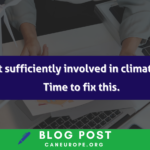Eurostat published today the latest trends on renewable energy sources. Despite continued progress in the share of renewables in the EU’s energy consumption, the pace of growth is slowing down. Therefore, EU countries can and must do more to achieve ambitious energy and climate targets for 2030.
The renewable energy share on average in the EU continues to go up, from 17.5% in 2017 to 18% in 2018. However, current speed will not be enough to allow the bloc to reach its renewable energy target for 2020 of 20%.
Hence, the statistical office’s findings show that the growth pace of the renewable energy share has slowed down since 2015*. This raises deep concerns about the ability for the EU to achieve its current 2030 renewable energy target of at least 32%, which will need to be increased once a new, higher 2030 climate target is agreed.
Veerle Dossche, EU Energy Policy Coordinator at Climate Action Network (CAN) Europe said:
“The share of renewable energy in the EU continues to be on the rise, but the current pace of growth is losing steam. EU leaders must fix this and translate their climate commitments into tangible policies that further steer investments away from fossil fuels towards 100% renewables-based energy systems. This is all the more necessary as drastic emissions cuts in the short term are needed to stay on a 1.5°C pathway.”
ENDS
Contact:
Nicolas Derobert, Head of Communications, nicolas@caneurope.org, +32 483 62 18 88
Note to editors:
*The table “Share of energy from renewable sources” shows that the average yearly growth in the renewable energy share has slowed down in recent years, compared with the average annual pace of growth recorded between 2005 and 2015.
Climate Action Network (CAN) Europe is Europe’s leading NGO coalition fighting dangerous climate change. With over 160 member organisations from 35 European countries, representing over 1.700 NGOs and more than 47 million citizens, CAN Europe promotes sustainable climate, energy and development policies throughout Europe.


